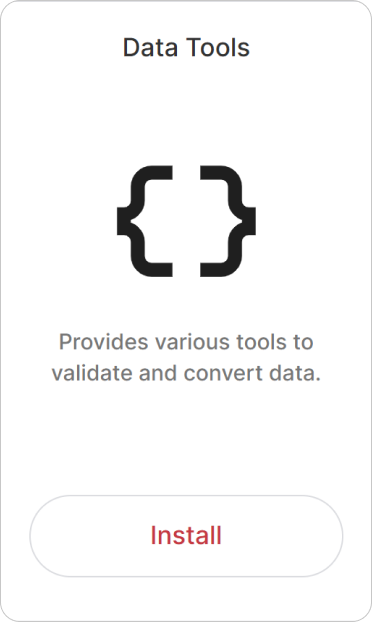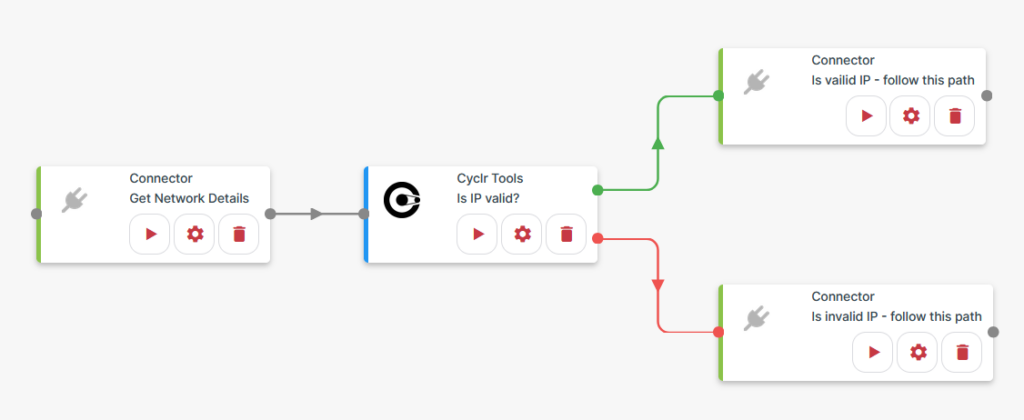
Updated on by Susanna Fagerholm
Regular expression, or “regex”, is a method used to match specific patterns within text strings. When data needs to meet exact criteria or if only certain pieces of information are to be extracted from lengthy strings, regex provides a highly efficient solution.
One of the ways regex can be easily incorporated into Cyclr integrations and workflows is through the Data Tools utility connector, which empowers users to build precise, accurate integration workflows. Let’s delve deeper into the Data Tools connector to discover how to utilize regex matches in integrations.
What is Regex?
At its core, regex is a concise language for describing patterns. These patterns can be anything, from a simple check like “Does this email look valid?” to more complex scenarios, such as confirming IP addresses or extracting phone numbers from text.
By utilizing regex in Cyclr, integrations can be instructed to check and validate data dynamically. Which can in turn significantly reduce manual effort and potential errors.
The Data Tools utility connector has a method called Regular Expression Match that has been designed to allow regex checks to be added into integrations. It has two exit points, True and False, which can be used to branch the integration workflow based on the regex match where needed.
- True Path: Triggered if the data matches your regex pattern. The matched data is then available for use in subsequent workflow steps.
- False Path: Triggered when data does not match the pattern. This path can be used for error handling, alerting, or other alternative processes.

Why Regex Matters in Integrations
Integration workflows frequently involve interactions with multiple APIs and data sources. APIs can return data in various formats, and ensuring consistency across these formats can be challenging.
Regex serves as a validation mechanism that ensures only data meeting predefined standards is processed. By validating data at an early step, costly and complex troubleshooting can be avoided later in the workflow.
For instance, if a service provides IP addresses as part of its API response, a regex step can be used immediately after the API call to confirm that the IP address format is valid. Thus avoiding the need for manual checks or the processing of incorrect data downstream.
Use Case: Validating IP Addresses
One of our Platform Developers, Patrick, built a use case that explains how Cyclr’s “Regular Expression Match” tool can be used to validate data within an integration — specifically focusing on checking whether an IP address returned by an API conforms to the correct IPv4 format.
In this scenario, a service returns a user’s last login IP address as part of its response. Before passing this data into a security logging system, it’s important to ensure that the IP address is valid. A regex check provides a lightweight, effective way to verify the structure of the address early in the workflow.
The regular expression used in this case looks like this:
^(([0-9]|[1-9][0-9]|1[0-9]{2}|2[0-4][0-9]|25[0-5])\.){3}([0-9]|[1-9][0-9]|1[0-9]{2}|2[0-4][0-9]|25[0-5])$This regular expression pattern matches IPv4 addresses. It ensures each part of the address (separated by dots) is within the valid numeric range of 0–255. Specifically, it checks that:
- Each IPv4 address has exactly four numeric sections separated by dots (.).
- Each numeric section is within the valid range:
- 0 to 9 ([0-9]),
- 10 to 99 ([1-9][0-9]),
- 100 to 199 (1[0-9]{2}),
- 200 to 249 (2[0-4][0-9]),
- 250 to 255 (25[0-5]).
The integration can then be continued according to how the valid IP addresses are intended to be used. For example, the True path might be connected to a logging step that records the valid IP or passes it to another system. The False path might be configured to send a notification, skip logging, or flag the entry.
The result is a more resilient, reliable integration that catches formatting issues early and handles them cleanly within the workflow logic.

Other Potential Practical Applications of Regex in Cyclr
Using regex adds a layer of data validation into your integration logic. You avoid pushing bad data downstream and can build alternate paths to handle errors cleanly. There are tons of possible use cases for regex in integrations, including:
- Email Validation: Quickly verify that emails from form submissions or customer records are formatted correctly.
- IP Address Confirmation: Ensure IP addresses returned by security or analytics APIs match valid IPv4 or IPv6 patterns.
- Data Extraction: Pull specific data (like order numbers or product IDs) from longer text fields without manual parsing.
Advantages of Regex Validation
By implementing regex within your integrations, you can achieve:
- Improved Data Quality: Automatically filtering out incorrect or malformed data means fewer issues downstream.
- Streamlined Error Handling: Early identification and handling of mismatches simplify debugging and enhance reliability.
- Efficiency Gains: Automation of pattern checks significantly reduces manual data validation tasks, allowing your team to focus on more strategic initiatives.
Regex can seem intimidating at first glance due to its symbolic syntax, but it becomes extremely powerful once mastered.
Conclusion
When used well, regex can quietly prevent countless issues even before they surface. By leveraging regex in integration workflows, small checks are made early that can save time, avoid errors, and keep data flowing as expected.
With a bit of practice, regex can become a natural part of how integrations are shaped, offering flexible, powerful solutions to complex data management challenges.
If you’d like to see Cyclr and the Regex Tool in action join us for a live demo!
We host a live demo every Tuesday and Thursday so you can see Cyclr’s integration capabilities.
